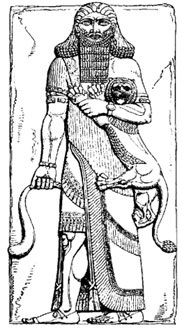Difference between revisions of "Template:Featured"
(→Easter, Baal and Israel) |
(→File:Page.png April's featured article) |
||
| Line 7: | Line 7: | ||
! style="padding:2px;" | | ! style="padding:2px;" | | ||
==[[File:Page.png]] April's featured article<span style="font-size:85%; font-weight:normal;">== | ==[[File:Page.png]] April's featured article<span style="font-size:85%; font-weight:normal;">== | ||
| + | ===Easter, Baal and Israel=== | ||
| + | Now that we know that Easter is the goddess Ashtaroth, we need to look into the Bible and see what God thinks of her, and notice her connection to Baal. | ||
| + | |||
| + | |||
| + | [[File:Ttigtio-nimrod_small1.jpg]]<br> | ||
| + | Nimrod | ||
| + | |||
| + | |||
| + | This first of two sources about Baal comes from Encyclopedia Britannica, and it begins to connect Baal to Ashtaroth: “The Semitic word baal, meaning owner or master, was also used in ancient religions for lord or god, and it is still defined as a Canaanite or Phoenician deity. Among the greatest of the Semitic peoples’ deities were Baal and Astarte—both symbols of fertility. Baal, the god of the sun, was supposed to make crops grow and flocks increase. Astarte [was] the goddess of the moon…” | ||
| + | |||
| + | Now read this quote from The Columbia Electronic Encyclopedia, Sixth Edition: “Baal had become the ruler of the universe. The Ugarit tablets make him chief of the Canaanite pantheon. He is the source of life and fertility, the mightiest hero, the lord of war, and the defeater of the god Yam. There were many temples of Baal in Canaan, and the name Baal was often added to that of a locality, e.g., Baal-peor, Baal-hazor, Baal-hermon. The Baal cult penetrated Israel and at times led to syncretism…The practice of sacred prostitution seems to have been associated with the worship of Baal in Palestine and the cult was vehemently denounced by the prophets…” (emphasis ours). | ||
| + | |||
| + | Baal was the most popular and powerful god of his time, considered to be “ruler of the universe” and Israel wanted to be associated with—to worship—both Baal and the true God. Hence, the above reference to “syncretism,” which is the mixing of true and false religion—the worship of the true God mixed with customs, practices and worship of other gods. | ||
| + | |||
| + | Merging worship of the true God with Baal worship was Israel’s problem. Remember, it led Elijah to indict all Israel: “How long halt you between two opinions? If the Lord be God, follow Him: but if Baal, then follow him. And the people answered him not a word” (I Kgs. 18:21). | ||
| + | |||
| + | Now let’s examine Israel’s involvement with Baal and Ashtaroth: “And the children of Israel did evil in the sight of the Lord…And they forsook the Lord, and served Baal and Ashtaroth[Easter]” (Judges 2:11, 13). | ||
| + | |||
| + | The context of the passage shows that God allowed His people to be taken from their land into foreign captivity as a result of this sin! It continues, explaining how God delivered His people over and over again through a series of judges. After each deliverance, Israel returned to the same false gods, which in turn brought another captivity, via conquest by the nations around them. They never seemed to learn, as Judges 2:19 makes clear: “And it came to pass, when the judge was dead, that they returned, and corrupted themselves…in following other gods…and…they ceased not from their own doings, nor from their stubborn way.” In Judges 10:6, Israel repeats this pattern of rebellion and stubbornness. And God, just as insistently, called it evil—as He still does today. | ||
| + | |||
| + | Baal and Ashtaroth worship reappeared during the prophet Samuel’s time. Samuel told Israel, “…put away the strange gods and Ashtaroth from among you, and prepare your hearts unto the Lord, and serve Him only…Then the children of Israel did put away Baalim and Ashtaroth, and served the Lord only” (I Sam. 7:3-4). Later, in I Samuel 12:10-11, Samuel publicly recounted Israel’s history to them. He reminded them that they continually returned to obeying God, only to fall backwards into idolatry again and again! | ||
| + | |||
| + | Let’s read one final example. The Bible states that King Solomon was the wisest man who ever lived. Yet, he made a mistake that God considered so great that, after his death, He punished Solomon by removing the kingdom from his son. | ||
| + | |||
| + | His mistake? | ||
| + | |||
| + | He married a woman who led him into the worship of Easter (Ashtaroth). Notice I Kings 11:4-6: “For it came to pass, when Solomon was old, that his wives turned away his heart after other gods…For Solomon went after Ashtaroth the goddess of the Zidonians…And Solomon did evil in the sight of the Lord, and went not fully after the Lord, as did David his father.” I Kings 11:11-12 demonstrate that the kingdom was, in fact, taken from his son. | ||
| + | |||
| + | God considered worship of this goddess as outright “evil.” This was even though Solomon was only “not fully” seeking the true God. | ||
| + | |||
| + | It has been said that “The only thing man has learned from history is that no one learns from history.” George Santyana took it further, stating, as we saw, “Those who do not learn the lesson of history are doomed to repeat it.” | ||
| + | |||
| + | This lesson describes ancient Israel—but it also describes today’s modern world. Because Israel could not stay on track, they were eventually taken into captivity, eventually becoming lost to history! (After one more captivity and punishment, prophecy reveals that God will gather them from captivity for the last time just before Christ’s Return.) | ||
| + | |||
| + | [[Category:]][[Category:]] | ||
| + | |||
| + | '''To Continue [[Click Here]]''' | ||
| + | ---- | ||
'''[[THE END IS NEAR]] '''Click Link''' | '''[[THE END IS NEAR]] '''Click Link''' | ||
Revision as of 15:27, 28 March 2014
|
|
|||||||||||||||||||||||||




